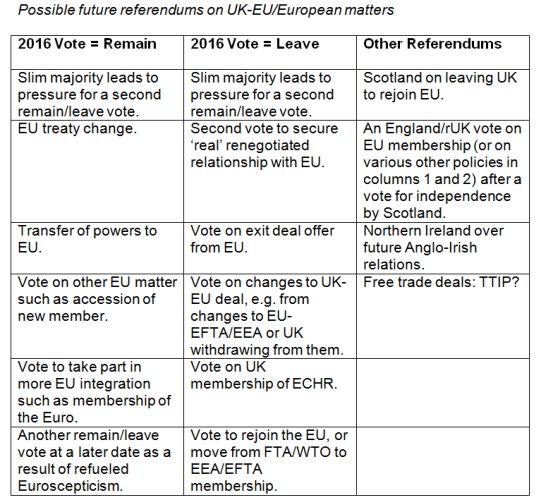How future UK European referendums might happen
Further referendums on Britain’s European question could happen whatever the result of June’s vote. In a recent report for the Federal Trust Tim Oliver sets out how the forthcoming referendum will not settle the European question and mapped out the different ways in which future referendums might come to pass.

Gibraltar © Devils Gap Road Union Jack steps
David Cameron told his EU counterparts that the UK’s EU referendum would settle the issue for a generation. Many of them would have been right if they were skeptical. The multifaceted nature of Britain’s European question means that whatever the result in the forthcoming referendum it will fail to answer Britain’s European question. It means that pressure to hold another referendum could soon build. Calling a referendum rests largely with the executive and especially the prime minister. They are, however, not immune to political and parliamentary pressures. Nor are they oblivious to the possibility of using a referendum as a tactic for dealing with a difficult political, government, economic, or diplomatic problem. By mapping out how a future referendum (or referendums) might be triggered we can see how the issue will not be settled for a generation and how future British governments will face an ongoing struggle with Britain’s European question. Granted, the possibility of any of the following actually happening varies widely, but until May 2015 many still felt a UK in/out referendum was a distant possibility.
Small majority for leave or remain
A referendum result where there is a small majority to remain an EU member, or one based on a small turnout (or won thanks to strong remain votes in areas such as Scotland or London) would leave Eurosceptics in no mood to concede defeat. If anything they would see such a result as a tactical defeat, not a strategic one. There are still frequent accusations that the 1975 referendum was unfair because of differences in campaign spending, biased media and political messages that some deem to have been deceitful. Similar accusations will almost certainly circulate following the 2016 vote. Anger and frustrations at the EU and the other factors noted throughout this pamphlet could soon refuel support for withdrawal. This could happen if the EU were too slow to deliver on the promised renegotiation or the changes promised take longer to emerge leaving British voters feeling cheated. Support for UKIP could remain high thanks to Conservative and Labour divisions over Europe and other political matters. Having watched its leader campaign to stay in the EU, the Conservative party’s membership may counter by electing a Eurosceptic leader to follow David Cameron. Calls for another in/out referendum could soon build.
New EU Treaty or transfer of powers
A new EU Treaty or transfer of powers to the EU would trigger the referendum requirement of the European Union Act 2011. While this depends on the interpretation of a minister that a major transfer of power is proposed, this does not prevent the Commons rebelling and voting for a referendum. David Cameron argued that the new relationship, one sanctioned by the British people in an in/out vote, would bring stability to the UK-EU relationship. But this overlooks the UK is attached to a European Union in flux. Prime ministers already feel compelled to return from European Councils with a clear statement that they defended British “red lines”. The renegotiated relationship would become the biggest red line of all. Any actual vote on changes to the relationship might be on the technicalities of transferring certain powers, but the debate and especially a rejection would open up the entire issue of the UK’s continued membership. The prospect of a new treaty to approve the restructuring of the Eurozone would certainly reopen the debate, possibly leading to calls for the UK to seek another renegotiated relationship. The UK may also imitate some other EU states by holding votes on aspects of EU policy, such as is soon to happen in the non-binding referendum the Netherlands will hold on EU-Ukrainian relations. Some Eurosceptics argue a vote to remain means a vote on the UK’s membership of the Euro becomes inevitable. While such a vote might seem unlikely today, it serves to remind us of the range of issues that could be used on which to build the case for another vote of some kind on UK-EU relations.
Second vote to secure a ‘real’ renegotiation or to approve exit deal
Should the UK vote to leave then further referendums can also not be ruled out. A small majority to leave, as with a small majority to remain, could lead to calls for a re-run of the vote, especially if some form of economic shock accompanied the result and saw opinion polls quickly register a switch to support for remaining in the EU. The vote, it is important to remember, does not bind Parliament and the UK would not withdraw from the EU until agreement was reached with the rest of the EU under the process set out under Article 50 TEU. Some Eurosceptics have argued for a vote to leave the EU as a means to apply more pressure to the EU so it then agrees to a more substantial renegotiation as a way of keeping the UK as a member. This tactic has been dismissed by David Cameron and critiqued by others. It cannot, however, be entirely ruled out as a possible development following a vote to leave. Equally, there may be some pressure for the British people to approve whatever UK-EU exit deal is put to them such as membership of EFTA or the EEA, especially by those who do not agree with the obligations or costs for the UK that these would bring. While it is unlikely, the British Government might repeat the approach of the Greek government of calling a referendum in order to show the opposition of the British people to any offer put to it by the EU.
Changes to any UK-EU deal with UK outside
Once outside the EU the new UK-EU relationship could come under pressure from changes by the EU. Should the deal be compromised by changes in the EU or the UK then the British Government could call a referendum as Switzerland did over changes relating to the free movement of people. This could be due to wider changes to the EU-EFTA/EEA relationships. Some Eurosceptics also see EFTA or the EEA as astepping-stone away from the EU, with a future referendum potentially called in an attempt to cut links with EFTA or the EEA. Given the political arguments about the UK’s membership of the ECHR a referendum could be called on that issue as well. Should the UK fail to reach an exit agreement with the EU or opt for some form of traditional trade deal, then it is possible that at a later date it will consider moving back towards the EU through membership of EFTA or the EEA (or reformed versions of them). Any such move, along with any attempt to rejoin the EU, could trigger a referendum.
Other UK referendums triggered
The European question could trigger other referendums within the UK over EU matters. A frequently foreseen outcome of a vote to leave the EU is one where Scotland votes to stay but the rest of the UK – and especially areas of England – vote to leave. Scottish nationalists would then use this as the basis on which to call a second Scottish independence referendum. Some commentators have also pointed to the constitutional crisis that could follow a vote to remain that won thanks to strong ‘remain’ votes in areas such as Scotland or London. This could cause resentment in the areas of England that voted to leave, adding to existing unease at the place of England within the UK. The possibility of a majority of the rest of the UK voting to leave the EU if Scotland left the UK could see pressure build for a second Scottish independence referendum. If Scotland then voted to leave the UK then this would be followed by a vote in the remaining UK (rUK) over continued membership of the EU.
In each of these referendums the UK’s public and political elite would wrestle with the problem of reducing the complexities of the UK-EU relationship to a single question. This is not to say that any of these votes and their campaigns, including the forthcoming one, will not provide the British people with a welcome opportunity to debate the European question. Referendums do provide opportunities for a big issue to be debated by a citizenry. The problem with the forthcoming referendum is not only that a multifaceted issue is being reduced to a single question but also that it is intended as a quick fix for the long-running failure to manage the issue. David Cameron told his EU counterparts that the referendum will settle the issue for a generation. Given that this is unlikely, the prospect of further referendums (whether in or outside the EU) at least offers the chance to test the idea that the more the British people debate the issue of Europe the better they will understand it, in turn allowing the issue to be better managed. The experiences of Denmark and Ireland are given as examples of two EU states where regular referendums have led to a more settled and better-managed relationships with the EU. This may be so, but it begs the question of how many referendums a state needs to have to reach such a stage. Both states have also rejected or come close to rejecting several votes on EU matters, and Denmark has a sizeable Eurosceptic movement. Britain therefore faces the possibility of descending into ‘neverendums’ in trying to deal with the complexities of the European question. It also faces the likelihood of frustration and bitterness from expectations that a referendum can settle a question that is deeply embedded into the very nature of the UK’s constitution, democracy, political economy, security, identity, unity, and place in the world.
__
This post originally appeared on the LSE Brexit blog. It represents the views of the author and not those of Democratic Audit UK or the LSE. Please read our comments policy before posting.
__
 Tim Oliver is a Dahrendorf Postdoctoral Fellow on Europe-North American relations at LSE IDEAS
Tim Oliver is a Dahrendorf Postdoctoral Fellow on Europe-North American relations at LSE IDEAS






 Democratic Audit's core funding is provided by the Joseph Rowntree Charitable Trust. Additional funding is provided by the London School of Economics.
Democratic Audit's core funding is provided by the Joseph Rowntree Charitable Trust. Additional funding is provided by the London School of Economics.
How future UK European referendums might happen https://t.co/jFKwu6Bets
How future UK European referendums might happen https://t.co/1JIpoM81eR
How future European referendums might happen in the UK https://t.co/HllfdCYkUO
This is useful. Analysis & discussion of permutations of #EURef results and future outcomes: https://t.co/X4rGK2jPfl https://t.co/JWWP0UklbR
How future UK European referendums might happen https://t.co/LCJQI2vv9C